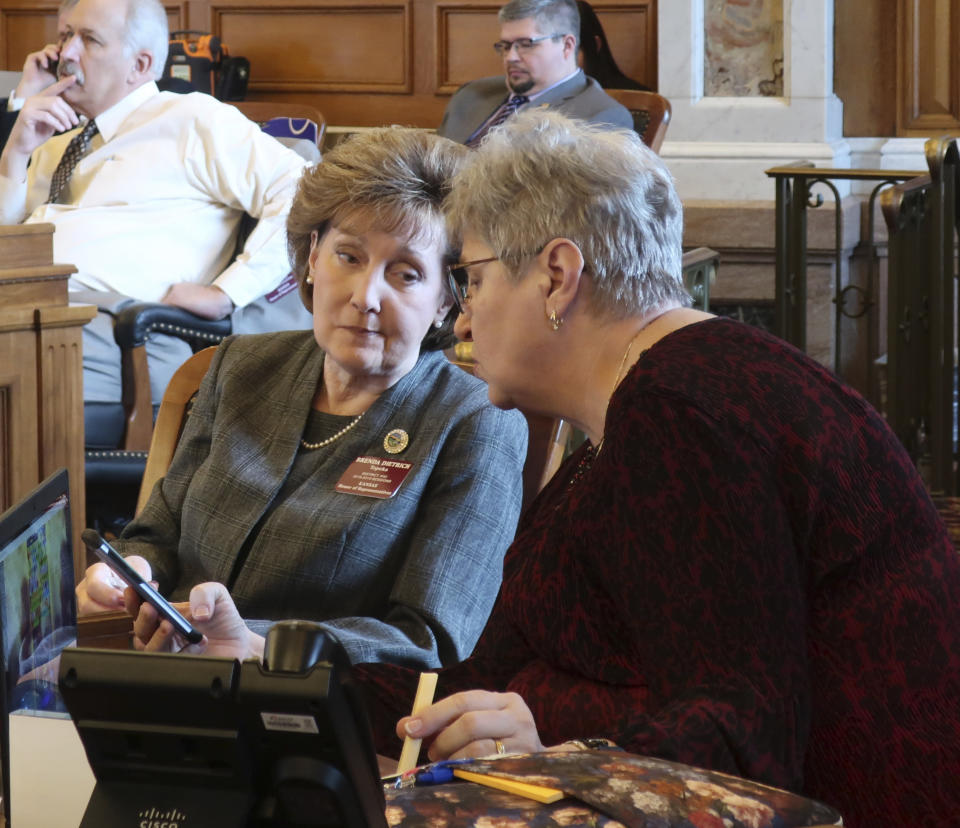Conservatives seek to put strings on new Kansas school funds
TOPEKA, Kan. (AP) — If Kansas' highest court is going to force state lawmakers to boost public education funding again, some conservative Republicans want something in return, including a say in how the extra money is spent and a voucher program to allow bullied kids to switch to private schools.
A state House committee expects to hold hearings this week on a public-school funding bill drafted by its conservative chairwoman and introduced Tuesday. It's an alternative to Democratic Gov. Laura Kelly's proposal for an increase of roughly $90 million in the state's more than $4 billion a year in education funding.
The Kansas Supreme Court ruled last year that the state's education funding remains inadequate despite increases in recent years. It gave the state's attorneys until April 15 to report in writing how lawmakers addressed the problem.
"Many of us don't subscribe to that theory, that if you just add more money and you do the same thing you've always done, you're going to get a different result," said state Rep. Kristey Williams, a Wichita-area Republican who is the House committee's chairwoman. "It's not just how much money you put in. It's how the money is used."
The House bill shows that conservative Republicans haven't given up on a long-standing goal to create a voucher program that would give tax money to parents with students in struggling public schools so they could send their children to other schools, including private ones. In 2014, legislators created a corporate tax credit to encourage contributions to scholarship funds for low-income students.
The new House bill would allow parents of bullied public school students to claim state tax dollars for their local public school as a scholarship for another school.
Williams unveiled the new legislation as the Senate prepared to debate Kelly's plan this week. Even if the Senate approves the governor's plan, negotiators for the two chambers are likely to draft the final version of the funding bill. Williams would lead the House's team, so policy ideas could remain in play.
Such a scenario played out in 2014, when an earlier Supreme Court ruling forced lawmakers to increase education funding. Conservative Republicans used their leverage to strip teachers of guaranteed tenure.
"It's that same kind of issue," said House Minority Leader Tom Sawyer, a Wichita Democrat. "It's a horrible bill."
The state Supreme Court has issued six rulings in the past five years requiring increases in education funding, saying lawmakers have a duty under the state constitution to provide a suitable education for every child.
A 2018 law phased in a $548 million increase in annual funding by the 2022-23 school year. The court said it was inadequate because it did not account for inflation.
"Just put the money in," said Mark Desetti, a lobbyist for the state's largest teachers union, summarizing the view of many educators.
The new House bill would provide $14 million more than Kelly's plan for schools during the budget year that begins in July, but it would direct much of the new money into programs for students with behavioral or mental health problems and other at-risk kids.
The measure also would require school districts with large cash reserves to burn through some of those reserves instead of relying on state dollars to finance their operations.
And it would strike provisions of the 2018 funding law that promised increases in the state's basic per-pupil aid to school districts for the 2021-22 and 2022-23 school years. House Speaker Ron Ryckman Jr., a conservative Olathe Republican, said legislators only should make "promises that we can keep."
The House bill would require the state to post data online about how well students perform and issue an annual "financial accountability" report detailing how districts spent their money — and what they spent on lawsuits against the state.
"We're all wanting what's best for kids," Ryckman said.
But with the Supreme Court's deadline looming and education groups advocating a narrow school funding bill, it's not clear how many moderate Republicans will stick with conservative leaders.
"Clean and simple is always my preference," said Rep. Brenda Dietrich, a moderate Topeka Republican and former school superintendent.
___
Follow John Hanna on Twitter: https://twitter.com/apjdhanna



